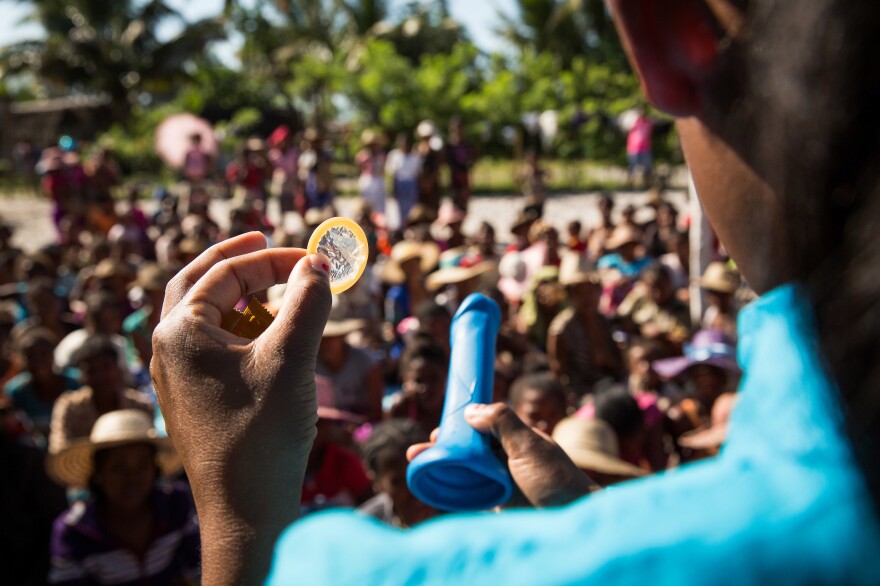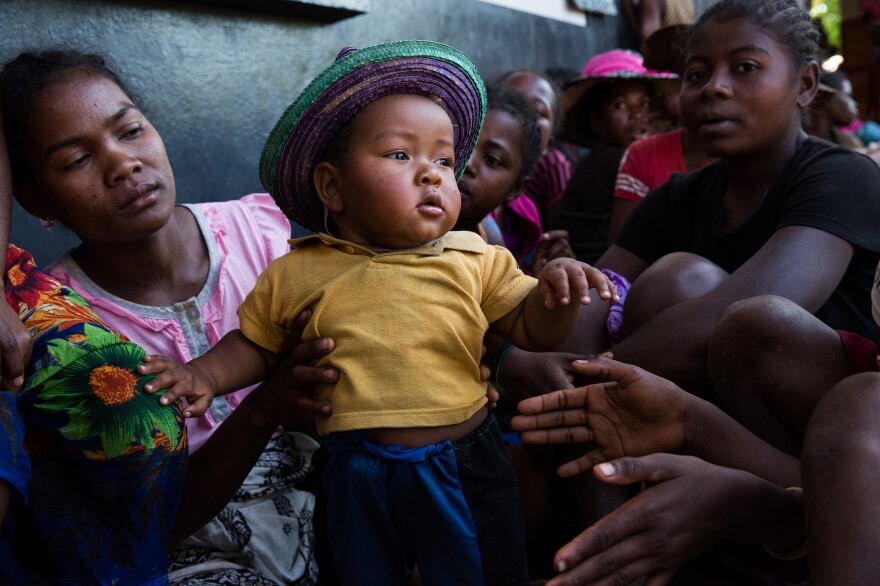Bacquerette woke up early. She made breakfast for her 2-year-old daughter, left the child with her neighbor and started the long walk to the village of Ambohitsara. Bacquerette wanted to make sure she was one of the first people in line for a one-day-only family planning clinic.
She walked almost two hours on footpaths that snake along the sandy bank of the Canal des Pangalanes in eastern Madagascar. And she managed to arrive at the event just after it started.
The 33-year-old single mother had come to get an IUD.
"Life is hard," Bacquerette says, explaining why she wants an IUD. "It's very hard to have very many children." Bacquerette, who like many people in this part of Madagascar goes by just one name, would like to have more children ... but not right now.
Trump's Cutback
This clinic might be her last chance to get an IUD or any other long-lasting contraceptive for the foreseeable future, mainly because of the changing political landscape 9,000 miles away in Washington, D.C.
One of the first acts of the Trump administration in January was to reinstate an abortion-related litmus test for foreign aid known as the "Mexico City policy."

Under the policy, foreign aid groups are barred from getting U.S. funding if they perform or actively support abortion anywhere in the world.
The Trump administration broadened the policy to apply not just to grants for family planning but to billions of dollars in global health assistance given to groups that offer everything from malaria prevention to HIV treatment.
The newly expanded policy is being felt throughout the developing world.
In Madagascar the change is forcing dramatic cutbacks by the largest provider of long-term contraception in the country, the British nonprofit Marie Stopes International. Nearly half of Marie Stopes funding in Madagascar, millions of dollars a year, had been coming from USAID.
In Madagascar, Marie Stopes does not provide abortions because abortion is illegal in the country. But the parent organization in London refuses to renounce abortion as part of reproductive health services in some of its operations in other parts of the world.
The loss of USAID funding has forced Marie Stopes to shut down a voucher program in Madagascar that allowed low-income women to get contraceptives for free at private clinics. And by the end of the year, it's planning to wind down 21 of its 22 mobile contraception clinics, which were funded entirely by USAID.
By Jeep, Train And Hovercraft
As part of the group's services, local nurses travel to incredibly remote parts of Madagascar in four-wheel- drive Land Cruisers, trains, boats and even hovercraft to run family planning clinics.


There's a saying in Ambohitsara that a married woman should bear at least 7 children for her husband. Some do, but many women now want fewer kids. And at the start of the contraception clinic event, that's abundantly clear.
More than 100 women and girls are packed in to the sandy courtyard of the health clinic. They range in age from 14 to their early 40s.
One of the nurses from Marie Stopes, Olivia Haingoniaina, is holding up a blue plastic replica of a penis and demonstrating how to use a condom. The crowd erupts in laughter when she jokes about how a condom is much easier to take off than put on.

Haingoniaina and her fellow nurse, Valeria Zafisoa, explain various ways to prevent pregnancy, including the rhythm method.
They remind the crowd that birth control pills and condoms are available through clinics by the national health ministry. If the women want long term contraception primarily implants or IUDs, Marie Stopes is offering them at this clinic for free

All of this has been funded by grants from the U.S. Agency for International Development.
In one room of the clinic, Zafisoa screens the women. Then next door Haingoniaina inserts the implant or IUD.
A Chief On A Mission
Among the visitors to the contraception clinic that day is Nirivelo, a chief from an adjacent village. He wants to make sure several teenage girls from his village get contraceptive implants.
Nirivelo says in the past having a large family was viewed as a sign of wealth and prosperity here. And girls would often start having children in their mid-teens.
He says families are now having fewer children, which means fewer mouths to feed. He adds that it's also easier to work the rice fields if you don't have a kid hanging off each hip. And delaying pregnancy also makes it more likely that girls will finish high school.

Nirivelo says that recently one girl from his village, a student at the secondary school in Ambohitsara, got pregnant. And it's been a big problem. Her parents are upset. They want the father of her child to marry her. But the boy's parents can't afford to pay a dowry, he says. It's caused a little war in the village.
To make sure this kind of situation doesn't come up again, he's telling the other students to come to this contraception clinic. That attitude reflects Madagascar's goals for family planning. In 2015 the government set an ambitious goal of boosting its rate of contraception use from 30 percent to 50 percent.
Shutting Down
But that soon may no longer be possible. Lalaina Razafinasoa, the country director of Marie Stopes Madagascar, says her group has already shut down some of its family planning work in the country and plans to stop the mobile contraception clinics in a matter of months unless they can find other source of revenue.
"It's really unbelievable to have to have this happen," she says.
Despite its reputation as an exotic Indian Ocean destination, Madagascar remains an incredibly poor country. More than 75 percent of the population lives in poverty.

Razafinasoa says the loss of U.S. funding means that hundreds of thousands of women in this country of 25 million people will lose access to contraception. And they will also lose the care that the group provides for women who defy the law and have illegal abortions. "We are providing post-abortion care," she says. "We are providing post-abortion family planning."
Razafinasoa pauses. She shakes her head as if she still can't really believe these cuts are happening.
"It will be a disaster," she says.
Copyright 2023 NPR. To see more, visit https://www.npr.org.







